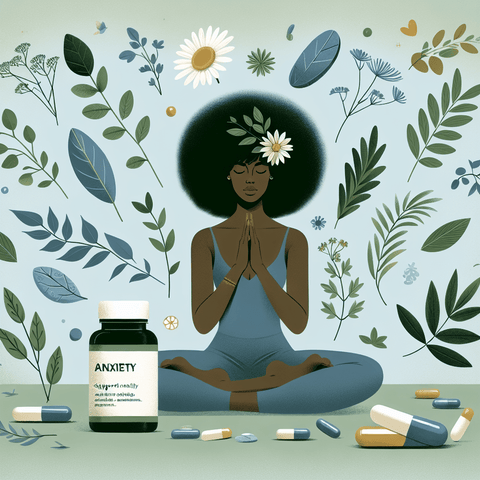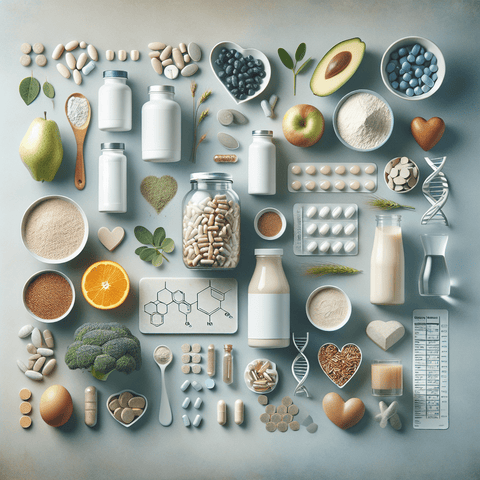Introduction
Anxiety is a common part of the human experience that ranges from brief episodes of worry to persistent symptoms that interfere with daily functioning. Interest in nutritional and botanical supplements has grown as people seek ways to support mental well-being naturally, either alongside psychotherapy and medication or as part of lifestyle-focused strategies. Supplements are not replacements for clinically indicated treatments, but they can supply nutrients and bioactive compounds that influence neurochemical pathways, sleep, inflammation, and energy metabolism — all factors that can affect how a person responds to stress. Because supplements may interact with prescription medications, worsen certain medical conditions, or be inappropriate during pregnancy and breastfeeding, consulting a qualified healthcare professional before starting a new regimen is essential. This article provides a balanced, research-informed review of supplements that people commonly consider for anxiety support. The goal is to summarize mechanisms, evidence, safety considerations, and practical tips for selecting products. Topics include mineral and vitamin options, amino acids and specific calming compounds, herbal extracts and traditional plants, pre-formulated stress relief capsules, and building a nutrient foundation that supports resilience. Where relevant, the post references product categories on Topvitamine to help readers explore formulations and ingredient varieties; examples include magnesium and omega-3 categories. Throughout the review, language is deliberately cautious: it describes associations, plausible mechanisms, and evidence from clinical trials and meta-analyses without asserting unapproved medical claims. Readers are encouraged to combine any considered supplement use with proven lifestyle measures such as consistent sleep, regular physical activity, balanced nutrition, stress management techniques, and evidence-based psychotherapy when needed. The remainder of this post examines individual supplement classes, what the research shows, how they may be used safely, and how to choose high quality products that align with personal needs and clinical advice.
Anxiety Supplements: Supporting Mental Wellness Naturally
Definitions and classifications for "anxiety supplements" vary, but most fall into a few categories: essential nutrients (vitamins, minerals, fatty acids), amino acids and neurotransmitter precursors, herbal extracts, and multi-ingredient formulations sold as stress or relaxation supports. Nutritional supplements can complement traditional anxiety treatments by addressing deficiencies, supporting biochemical pathways, or providing compounds that modulate neurotransmission and stress physiology. For example, B vitamins are cofactors in neurotransmitter synthesis and cellular energy; magnesium is involved in neuronal signaling and muscle relaxation; and omega-3 fatty acids participate in cell membrane composition and signaling. Amino acids such as L-theanine, which is found in tea, have been investigated for calming effects, and 5-HTP, a serotonin precursor, has been evaluated in mood research. Herbal extracts target a variety of pathways — many claim GABAergic, serotonergic, or adaptogenic effects — though potency and mechanisms depend on phytochemical composition and standardization. Key considerations when choosing supplements include baseline nutrient status (deficiency vs sufficiency), potential interactions with medications (antidepressants, benzodiazepines, blood thinners), formulation and bioavailability, manufacturing quality, and personal health conditions such as pregnancy or liver disease. Evidence quality is heterogeneous: randomized controlled trials exist for some agents, while many products rely on observational data or small trials. When interpreting research, look for adequately powered randomized trials, clear outcome measures, and replication across populations. Practical purchasing tips include choosing products with transparent labeling, third-party testing (for contaminants and potency), and clear dosing instructions. In many cases, modest benefits reported in trials are context dependent — they may be more likely when a deficiency is present or when used as adjunctive therapy. Finally, tracking effects with a symptom diary or validated scales can help determine whether a chosen supplement offers tangible benefit over time, and clinicians can support safe titration and monitoring based on individual response.
Natural Anxiety Aid: Herbs and Extracts for Calmness
Herbal remedies are among the most widely used natural options for supporting calm and reducing situational tension. Historically utilized across cultures, several plant extracts have gained contemporary scientific attention. Passionflower, valerian root, and lemon balm are commonly discussed; each contains distinct phytochemicals that may interact with GABAergic signaling, receptor function, or neurotransmitter metabolism. Passionflower contains flavonoids and alkaloids thought to influence GABA-related pathways. Valerian produces valerenic acids that may interact with receptors associated with neuronal excitability, and lemon balm offers polyphenols such as rosmarinic acid that have been investigated for mild calming effects. The appeal of botanicals includes a desire for gentler symptomatic relief and, for some people, fewer daytime sedative consequences compared with some prescription sedatives. However, evidence is mixed: some randomized controlled trials report small to moderate benefits, while systematic reviews often highlight heterogeneity in study design, preparation, and endpoints. Safety profiles differ by herb and formulation. For instance, valerian is generally well tolerated for short-term use but has been associated with headache or gastrointestinal upset in some users; passionflower has demonstrated favorable tolerability in short trials; and kava, a traditional anxiolytic in some cultures, has been associated with rare cases of liver injury and is regulated in certain countries. Practical guidance for safe herbal use emphasizes choosing standardized extracts where available, selecting manufacturers that provide certificates of analysis or third-party testing, starting at lower doses to assess tolerance, and communicating with healthcare providers about all supplements taken. Consideration of form (tea, tincture, capsule) is important because extraction method and dosage form influence potency and onset. Because herbs can interact with pharmaceuticals affecting serotonin, GABA, or hepatic metabolism, clinicians should evaluate interactions before recommending combination approaches. When used thoughtfully within a comprehensive plan that includes behavioral strategies, herbal extracts can be one component of an individualized approach to supporting calm.
Herbal Anxiety Remedies: Traditional Plants with Modern Benefits
A closer look at specific traditional plants helps illustrate mechanisms, benefits, and precautions. Kava kava (Piper methysticum) has been used traditionally in the Pacific Islands for ceremonial relaxation and has shown short-term reductions in anxiety symptoms in some clinical trials; constituents called kavalactones are thought to modulate GABAergic transmission and ion channels. However, concerns about hepatotoxicity in rare cases have prompted regulatory actions in some regions and highlight the need for quality sourcing, avoidance of excessive dosing, and medical oversight, particularly for those with preexisting liver disease or who consume alcohol. Ashwagandha (Withania somnifera) is an adaptogenic herb from Ayurvedic medicine studied for stress reduction and perceived stress scores; proposed mechanisms include modulation of hypothalamic-pituitary-adrenal axis activity and antioxidant effects. Clinical trials suggest potential benefit for stress and sleep parameters, but differences in extract preparation and participant characteristics mean results are not uniform. Skullcap (Scutellaria lateriflora) is another traditional herb used for nervous tension; its flavonoids may influence central nervous system receptors, though high-quality clinical data remain limited. When assessing neurological effects, researchers consider receptor binding, neurotransmitter modulation, and downstream clinical outcomes. Potential side effects vary: kava concerns center on liver risk, ashwagandha can cause gastrointestinal upset or thyroid function changes in rare cases, and skullcap quality issues have historically been associated with contamination. Choosing quality herbal supplements involves verifying standardized extract concentrations, reading labels for additional ingredients, preferring manufacturers adhering to good manufacturing practices, and seeking products with third-party certificates that test for heavy metals, microbial contamination, and accurate potency. Clinicians typically recommend short trial periods while monitoring symptoms and labs when indicated. For anyone on multiple medications or with chronic health conditions, seeking medical guidance before initiating herbal remedies is prudent to reduce the risk of interactions and adverse effects.
Calming Supplement Options: Nutrients and Compounds for Relaxation
Beyond herbs, specific nutrients and single-molecule compounds have attracted attention for their calming potential. Magnesium is among the most discussed minerals because of its role as a cofactor in enzymatic reactions, neuronal signaling, and muscle and vascular tone regulation. Different magnesium salts (citrate, glycinate, malate, oxide) vary in absorption and gastrointestinal tolerability; magnesium glycinate and citrate are commonly selected for better bioavailability and lower laxative effects. For readers who want to review magnesium supplement types, Topvitamine includes a dedicated magnesium category that outlines forms and product details. B-vitamins, notably B6 and the B-complex group, are cofactors in neurotransmitter synthesis (e.g., serotonin, GABA) and cellular energy metabolism; correcting deficiencies can support overall neural function and energy. Omega-3 fatty acids (DHA and EPA) are structural components of neuronal membranes and have been evaluated for mood and cognitive health; some evidence suggests benefits for depressive symptoms and emotional regulation, and the Topvitamine omega-3 category provides options with varying EPA/DHA ratios. Amino acid–derived compounds such as L-theanine, an amino acid found in green tea, have been associated with relaxed alertness and reductions in physiological markers of stress in some trials; it is typically non-sedating. 5-HTP, a serotonin precursor, has been studied in mood contexts but can interact with serotonergic medications and should be approached cautiously. Melatonin is primarily a sleep-regulating hormone that can indirectly affect anxiety by improving sleep quality; short-term use for circadian issues can be helpful for sleep timing but long-term use should be discussed with a clinician. Across these compounds, study outcomes vary by population, dose, and duration. Recommended dosages often fall within ranges used in clinical studies, but individualized advice from a healthcare professional based on baseline status, concurrent treatments, and potential contraindications is the safest route. Combining nutrient strategies with lifestyle measures such as sleep hygiene, physical activity, and structured stress management improves the probability of meaningful benefit.
Stress Relief Capsules: Convenient Solutions for Daily Anxiety Support
Stress relief capsules and multi-ingredient formulas are marketed to provide convenient daily support by combining vitamins, minerals, amino acids, and herbal extracts into a single product. Typical capsule blends may include magnesium, B-complex vitamins, L-theanine, GABA, herbal extracts like valerian or lemon balm, and sometimes adaptogens such as ashwagandha or rhodiola. The idea is to provide a broad-acting approach that targets sleep, nervous system balance, and resilience to stressors. When evaluating pre-formulated capsules, scrutinize the ingredient list for clinically relevant doses rather than trace amounts, and avoid proprietary blends that do not disclose amounts for each component. Manufacturing transparency is important: choose products with batch testing, third-party verification, and clear labeling of excipients and allergens. Consider the potential for cumulative dosing if you also take single-ingredient supplements; for example, combining a magnesium capsule with a multi-ingredient product that contains additional magnesium could lead to higher total intake than intended. Another practical consideration is timing: some blends are designed for daytime use and emphasize alertness-supporting ingredients, while others are formulated for evening use emphasized by herbs and melatonin to support sleep initiation. Cost and pill burden matter for adherence, so balancing convenience with appropriate ingredient profiles helps optimize long-term use. Products sold as stress relief capsules can be useful adjuncts as part of a broader approach that includes nutrition, exercise, and stress reduction techniques, but selecting high-quality manufactures and discussing plans with a clinician will minimize safety risks and improve the chance of appropriate benefit.
Anxiety Support Nutrients: Building a Foundation for Mental Resilience
Foundational nutrients play essential roles in brain chemistry, inflammation regulation, and cellular energy — all relevant to anxiety and mood regulation. Vitamin D receptors are present in brain regions involved in mood and cognition, and low vitamin D status has been associated with higher rates of mood disturbances in observational studies; supplementation to correct deficiency is a common clinical strategy, and Topvitamine offers a vitamin D category for consumers to review forms and dosing considerations. Adequate intake of zinc and selenium supports antioxidant defenses and immune function; deficiencies can affect overall wellbeing and energy. Iron deficiency is particularly important to detect and correct because iron plays a role in oxygen transport and neurotransmitter synthesis; iron supplementation should only follow testing and clinical guidance. Adequate protein and amino acid intake provides precursors for neurotransmitters, and B-vitamins enable metabolic steps in neurotransmitter synthesis and mitochondrial energy production. When deficiencies exist, supplementing to replete stores can remove a physiological burden that may exacerbate anxiety-like symptoms. Nutrition strategies that emphasize whole foods rich in essential fatty acids, fiber, micronutrients, and adequate protein support baseline resilience. For people unable to meet needs via diet alone, thoughtful supplementation targeted to identified insufficiencies is reasonable, ideally following laboratory evaluation. Personalization matters: genetics, age, medical conditions, medications, and lifestyle influence nutrient requirements and absorption. Testing for vitamin D, folate, B12, and relevant minerals can guide safe and effective use. Combining diet optimization with evidence-based supplements and behavioral strategies creates a robust foundation for supporting mental health over time, and regular reassessment ensures the ongoing appropriateness of any supplement regimen.
Conclusion
There are numerous supplements that people explore for anxiety support, including minerals like magnesium, vitamins such as vitamin D and B-complex, omega-3 fatty acids, amino acid compounds like L-theanine, herbal extracts such as passionflower, valerian, lemon balm, kava, ashwagandha, and a variety of pre-formulated stress relief capsules. The evidence base ranges from well-powered randomized trials to small pilot studies and observational data, so expectations should be measured: many supplements show modest benefits for some people, especially when deficiencies exist or when supplements are used alongside lifestyle and psychological interventions. Safety and product quality are paramount; avoid making changes without professional advice, particularly if you are taking medications, are pregnant, or have chronic medical conditions. Selecting reputable manufacturers, preferring standardized extracts and third-party testing, and tracking responses over time can help people make safer decisions. Topvitamine’s product categories, such as magnesium, omega-3, and vitamin D, provide starting points for exploring forms and dosages, but clinician guidance is recommended to match choices to individual needs. Ultimately, the best approach combines nutrition, movement, sleep hygiene, stress management techniques, and professional mental health care when appropriate. Supplements can be a supportive piece of that multifaceted strategy when chosen thoughtfully and monitored over time.
Q&A
Q: Can supplements cure anxiety? A: Supplements are not cures for clinical anxiety disorders. They can support nutrition and physiological processes related to stress and mood, and may provide modest symptomatic relief for some individuals, particularly when deficiencies are present. Clinical treatments such as psychotherapy and prescribed medications remain central for moderate to severe anxiety and should not be discontinued without professional guidance.
Q: Which supplements have the most evidence for anxiety support? A: Evidence varies by supplement. Magnesium and L-theanine have randomized trials showing modest benefits in some populations. Omega-3s have supportive evidence for mood regulation and emotional processing in some studies. Certain herbal extracts have clinical trial data suggesting short-term benefits, but study heterogeneity and differences in formulations make conclusions less definitive. Vitamin D repletion is important if a deficiency exists, given its connections to overall wellbeing.
Q: Are herbal remedies safe to use with prescription medications? A: Not always. Herbs can interact with medications by affecting drug metabolism or by additive effects on neurotransmitter systems. For example, combining serotonergic drugs with serotonergic supplements may increase risk of serotonin-related effects. Kava has concerns about liver safety; St. John’s wort can lower levels of many medications through enzyme induction. Always discuss herbal use with a prescribing clinician.
Q: How do I choose a reputable supplement? A: Look for transparent labeling that lists ingredient amounts, choose manufacturers that follow good manufacturing practices, and prefer products with independent third-party testing or certificates of analysis. Avoid proprietary blends that do not disclose amounts. Consider the form and dose used in clinical studies when possible. For mineral options, review product forms such as in the Topvitamine magnesium category to compare citrate, glycinate, and other salts.
Q: When should I see a healthcare professional? A: Seek professional advice before starting supplements if you are taking prescription medication, have chronic medical conditions, are pregnant or breastfeeding, or have a history of liver disease. Also consult a clinician if anxiety symptoms are persistent or worsening, or if they interfere with daily functioning — clinical evaluation can identify appropriate evidence-based treatments and whether supplements may be complementary.
Important Keywords
anxiety supplements, natural anxiety aid, herbal remedies for anxiety, magnesium for anxiety, L-theanine, GABA supplements, valerian root, passionflower, lemon balm, kava, ashwagandha, omega-3 fatty acids, vitamin D, B vitamins, stress relief capsules, calming supplements, Topvitamine magnesium, Topvitamine omega-3, Topvitamine vitamin D, supplement safety, supplement quality
References & Further Reading: For product categories and detailed ingredient options visit Topvitamine’s collections for magnesium, omega-3, vitamin D, and vitamin C to review formulations and supporting details relevant to the supplements discussed above.



